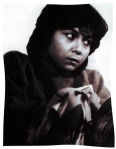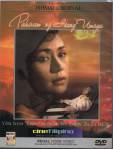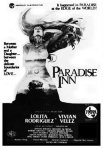As I was ending one of my classes in Humanities I (Art Appreciation), I had a rather spirited conversation with some of my students regarding local films, particularly of the 80’s. Of course, this decade was embraced by a dose of really monumental works from the country’s acclaimed filmmakers. Yet, this was also a time of severe commercialism in film, so much so that in 1987, a notable group of film critics refused to give out the usual yearly citations and recognitions for the simple reason that there were no deserving nominees, much more winners.
Back to my class. I ended up recommending a few films from the 80’s to some students who looked really interested. Though I may not be as helpful in looking for the actual copies of these films, I believe that somehow, I was able to enhance their knowledge on Philippine Cinema especially its rich and checkered history. These kids practically grew up in a national cinema that featured dizzying close ups of matinee idols and Fil Ams who probably know nothing but wooden acting. Thank heavens for the indie revolution!
Let me share my personal list of notable films from the 80’s, and just a few reasons why I particularly liked each film.
1. Bona by Lino Brocka – This film is just shimmering with raw humanity. Actress Nora Aunor reveals yet another layer of her acting chops in this film about a slum girl who is obsessed with a movie bit player. Despite numerous technical flaws, the film features topnatch acting and restrained melodrama from the country’s most prominent director.
2. Manila by Night by Ishamel Bernal – This cyclical film from Ishmael Bernal features a cast of sleezy and weird characters from Manila’s underbelly. A film devoid of hope and clean cut morality, it is very interesting how the city of Manila becomes a character in itself, as it seduces, traps, confronts, and eats its own children. While the sex scenes can still be shortened, the real gift of this film is its director, who also happens to be the film’s writer. Bernal here dramatizes his personal tribute to a city so beautiful yet so horribe at the same time.
3. Kisapmata (In The Blink of An Eye) by Mike de Leon – This political film is probably Mike de Leon’s best. He gets everything right in this film – the mood, the acting, the cinematography, the music, everything! This shocking film is probably one of my favorites. It’s just timeless!
4. Salome by Laurice Guillen- The Filipino version of Akira Kurosawa’s Rashomon, the film features a career crowning performance from Gina Alajar and a thespic zenith for its director. The film focuses on the subjectivity of truth, as a housewife is tried for the murder of a cityboy. Issues of rape,adultery,unfaithfulness all come to play in a town plagued by gossip mongers. Watch out for the ending as it truly is poetic and unforgettable.
5. Batch ’81 by Mike de Leon – Another political film from Mike de Leon. It uses the college fraternity as a microcosm of a society suffering under a fascist regime, where acts of violence and inhumanity are disguised amid the lofty ideals of order, unity, and brotherhoood. The fight scenes in this film are just unforgettable, not to mention the highly symbolic production numbers from the three fraternities towards the final third of the film.
6. Himala (Miracle) by ishmael Bernal – This rather philosophical film focuses on religion as the new opiate of the masses. It tells the story of how a woman manages to fool an entire provincial village plagued by drought on how the Virgin Mary appeared to her. Actress Nora Aunor is again at the top of her game and she is backed by an equally spectacular supporting cast. It is also impressive how Bernal uses the location to effectively communicate and enrich the audience’s viewing experience. Though slow and dead-serious in many parts, the film is truly one of Philippine Cinema’s best.
7. Oro, Plata, Mata by Peque Gallaga – This epic film tells the story of two families and how the Japanese occupation left scathing wounds of war and psychological turmoil in their lives. The production design in this film is just superb. Jose Javier Reyes’ screenplay is also keenly observant. Truly, all of Gallaga’s succeeding works seemed inferior to this masterpiece.
8. ‘Merika by Gil Portes – This melancholic film is truly one from the heart. It is an early indictment of the American Dream and how it has affected the lives of Filipinos who have dreamt all their lives to reach the United States. This quiet but moving film is gifted with notable performances from Nora Aunor as the lonely nurse and Bembol Roco as her opportunistic suitor. The cinematography and production design are also commendable. The music underscores feelings of loneliness, nostalgia,and desperation.
9. Paradise Inn by Celso Ad Castillo – This film is another production that mirrors the nation’s sociopolitical climate during the turbulent 80’s. Despite lopsided scripting and overscoring, the film manages to succeed thanks to memorable performances from Lolita Rodriguez and Vivian Velez, who play mother and daughter who are managing a sleezy bar cum brothel in the midst of a politically charged provincial town. This film uses subtle yet powerful images that call for revolution against a repressive regime. This film came out in December of 1985 — 2 months before the EDSA Revolution that toppled the dictatorship.
10. Pahiram Ng Isang Umaga (Lend Me One Morning) by ishmael Bernal – A tearjerker through and through, this melodrama, thankfully, is not devoid of great acting from Vilma Santos, who plays a dying working mom trying to make sense of her life that is about to come to an end. Apart from Santos’ noteworthy performance, the film also features powerful images of life and death, body and would-be-spirit, while at the same time channeling the commercialist workings of melodramas in the Philippines.









